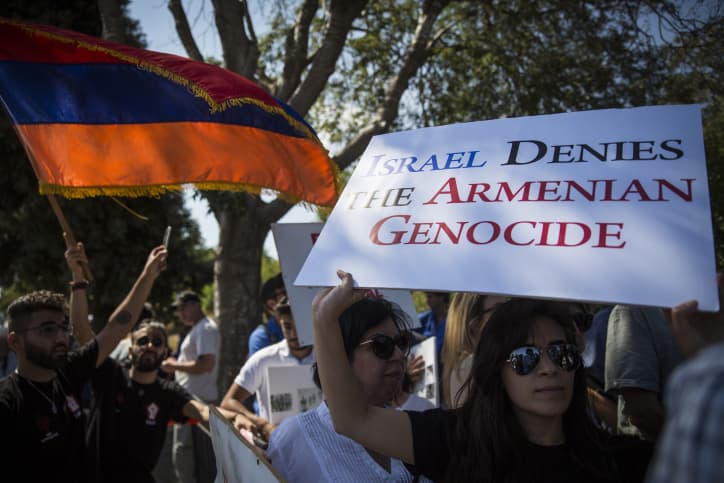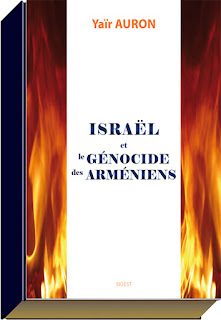FOI request for information on agreements and commitments undertaken by the State of Israel
vis-a-vis Turkey and Azerbaijan as
to not recognizing the Armenian genocide
On April 24 1915, in the midst of WWI, the rulers of the collapsing Ottoman Empire began the annihilation of the Armenian people. In less than four years, after 2,400 years in which Armenians lived and thrived
within the region between the Caspian Sea, the Black Sea and the Mediterranean Sea, hardly any Armenians remained. More than a million were murdered and the survivors were scattered all over the world. Men, women and children were sent on “death marches”, detained in concentration camps, raped and murdered. News on the genocide was published by newspapers in the US and Europe as it was happening.
within the region between the Caspian Sea, the Black Sea and the Mediterranean Sea, hardly any Armenians remained. More than a million were murdered and the survivors were scattered all over the world. Men, women and children were sent on “death marches”, detained in concentration camps, raped and murdered. News on the genocide was published by newspapers in the US and Europe as it was happening.
US Ambassador in Istanbul at the time, Henry Morgenthau, tried to help the Armenians and lessen, if only slightly, the extent of the atrocities. Sarah and Aharon Aaronsohn, Eitan Belkind and other members of the Nili group witnessed the events and their hearts told them a hidden thread connected the fate of the Armenians and the fate of the Jews. Franz Werfel, a German writer of Jewish descent, learned of what happened to the Armenians and published his book « Forty Days of Musa Dagh » in Germany in November 1933, ten months after Hitler’s rise to power.
The Turkish state which was founded in 1923, was determined to forget and cast into oblivion this terrible episode in Turkish history. In 1965, after descendants of the Armenian refugees in the diaspora began to demand international and Turkish recognition of the genocide, Turkey embarked on an extensive and resolute denial campaign. Similarly, and in view of the conflict between Azerbaijan and Armenia as to the Nagorno-Karabakh province, Azerbaijan has become Turkey’s partner in leading the denial of the Armenian genocide.
Unfortunately, in spite of the existence of an Armenian community in Israel and in spite of a continuous public, academic and political campaign, the Armenian genocide has not been recognized by the State
of Israel.
of Israel.
Prima facie, it seems that the official Israeli denial of the Armenian genocide is tied to its diplomatic and military relations with Turkey, and in recent years to the relations with Azerbaijan. Turkey and Azerbaijan have purchased from Israel military training and weapon systems worth billions of USD.
Minister of Defense Avigdor Lieberman, former Deputy Minister of Foreign Affairs, Mr. Danny Ayalon, former Chairman of the Knesset Education Committee, MK Alex Miller, as well as additional MK’s from ‘Israel Beitenu’ party clarified unequivocally that the State of Israel would not recognize the Armenian genocide so as not to harm relations with Azerbaijan, over controversial historical issues concerning century-long events. Their arguments remind those of holocaust deniers.
Under these circumstances, one suspects that not only does the State of Israel “trade” in the recognition of the Armenian genocide, but that it has also taken upon itself real commitments on this matter, in
agreements with Azerbaijan and Turkey.
agreements with Azerbaijan and Turkey.
This is why together with the genocide scholar Professor Yair Auron, we asked the Israeli Ministry of Foreign Affairs to expose to the public: Any documentation of agreements, understandings, commitments vis-a-vis Azerbaijan and Turkey as to the question of recognizing the Armenian genocide; Any correspondence with Turkish or Azeri representatives on the question of recognizing the Armenian genocide; Any documentation of meetings or communications between representatives of the Ministry of Foreign Affairs with Turkish or Azeri representatives on the question of recognizing the Armenian genocide; Decisions
and position papers of the Ministry of Foreign Affairs as to the question of recognizing the Armenian genocide, in view of Turkey and Azerbaijan’s objection.
and position papers of the Ministry of Foreign Affairs as to the question of recognizing the Armenian genocide, in view of Turkey and Azerbaijan’s objection.
Link to the FOIA request:
https://files.acrobat.com/a/preview/0d4ff53b-02eb-4e0f-b3ef-5438b1dd5fc0


